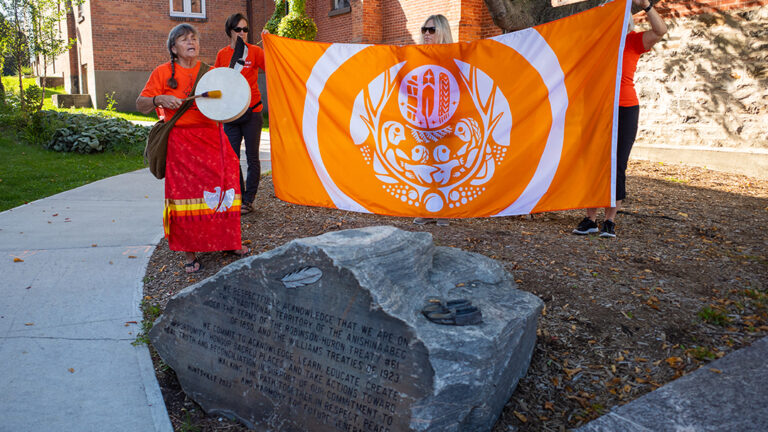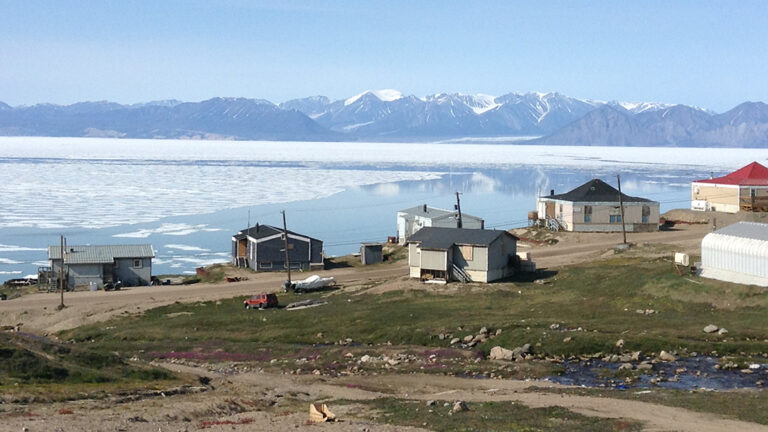Angela Marston is an artist located in BC. She holds a B.A. in Visual Arts and First Nations Studies, and finishing a Master in Organizational and Business Psychology. She is the Director of Indigenous Relations at Innovations in Health Society, and a Senior Consultant at Four Salish Winds Consulting. She is currently working on a language revitalization project for the Hul’ q’ umi’ num’ Language and Culture Society, while writing funding proposals for SPARX a video game that incorporates cognitive behavioural therapy with a focus on Indigenous Communities. She spends a lot of her professional time advising organizations on protocols for Indigenous engagement. The Centre requested her expertise in reviewing an application for an Indigenous initiative.
I’ve been a reviewer for Indigenous art programs in BC for the last 15 years but I’ve been writing applications for grants and funding, as an artist, for the last 20 years. About 5 years ago, I started working in social development: I administered social assistance, and started learning about mental health and was a board member for our local mental health service provider. Five years ago I started to learn more about homelessness, and other issues in our community. That made me want to learn more about these issues on a national scale. As a project reviewer, I did my best to offer my opinions and my ideas. I understand the peer-review process, the administrative process: I really enjoyed it, and I appreciated that the Centre was considerate of my time. I have been on peer review panels that lasted several days, so I appreciated the intelligible format and the guidance.
On Her Expertise: Indigenization
There’s a trend right now with organizations Indigenizing, but often people aren’t certain what that means. What is Indigenization? I asked a panel what does Indigenization mean to them, and they told me they didn’t know and they were hoping I would be able to tell them. Where’s the accountability of the staff to better understand Indigenous worldviews and to do the research? Because it’s all there: there’s so much information out there. There’s a lot of expecting of Indigenous communities to continuously give, but a protocol in Indigenous communities is reciprocity and this often is overlooked with non-Indigenous organizations, they don’t understand that cultural concept and often overlook the protocol. We often see when Indigenous staff are hired, they aren’t remunerated for their cultural expertise adequately and this is an ongoing issue of systemic racism and inequality. There’s definitely a lot of arrogance. I was talking to a friend just the other day, she had left the organization she was working for and she said, “I’m not your token.” Tokenism is when an organization hires some Indigenous employees, and they pat themselves on their back and say, “We’re all good, we’ve Indigenized.”
On Being Part of the Conversation
I studied Indigenous studies in university, and we are now working with that same university to create cultural awareness modules for organizations, and government ministries, so they can educate their staff. It’s important to hire Indigenous staff to head these initiatives: a non-Indigenous person might delve into more stereotypical activities like making dream catchers, or facilitating talking circles and not understand that these are not practiced in each community. But not every Indigenous community is the same. You really have to know which programs you’re going to have to run that will connect with the community. That’s often a common error: the misunderstanding of Indigenous art, or let’s say, they think a sweat lodge is a good idea but not all communities practice the sweat lodge. When you travel to another country, you do the research but when people live in a certain community, they don’t give it the same care and attention.
BLM and Indigenization
In a recent conversation someone mentioned the erasure of the black community in Vancouver and we talked about colonial frameworks and assimilation. It’s totally relevant: Indigenous Peoples have been advocating and pushing for inclusion, and now organizations are being confronted about how they’re going to create space for Indigenous systems, programs and employees. I’ve worked with non-Indigenous organizations that wanted to understand how to engage with Indigenous populations. Some organizations believed if they had an elder come in and do a prayer, then that was inclusive enough. When we looked at actually hiring senior Indigenous staff members, very few organizations across the province had done so. People are struggling with creating policies from a colonial framework while looking at Indigenization, it doesn’t work. I feel like you need to dismantle everything and then rebuild—and that includes evolving colonial language.
On Indigenous Homelessness from an Indigenization Mindset
Most homeless centres are based on a colonial model. If you have one community that really values individualism, and another community that values a family-centric approach, those models are going to be very different. In BC, Indigenous families tend to live together. So when you are looking at building a homeless shelter, and housing everyone in separate apartments, this is not the best model for a community of people that are family orientated. I think that needs to shift: If you don’t understand the values of Indigenous communities and you’re trying to build low-income housing, you need to learn what the needs of the community are before designing something that is based on a different worldview and set of values.
On the Importance of Sector Leaders Applying as Project Reviewers
The assigned project is a perfect example: it’s culturally specific and if you don’t have a reviewer that understands these cultural realities, they will miss a lot. There are a lot of Indigenous programs in BC, mainly driven by the government mandate and you have all these non-Indigenous organizations, and institutions like universities, applying for the Indigenous funding that is now available. And if they’re writing policies that will impact Indigenous communities, I think it’s really important to have some leadership that speaks to these cultural nuances, within those programs. If you look at this project, it’s also about Indigenous culture in BC and understanding program development in Indigenous communities and the people. It’s more than just a housing program.



